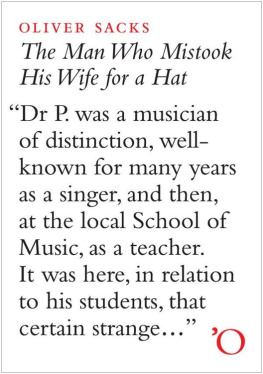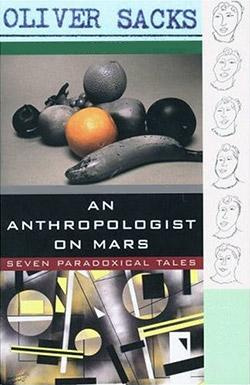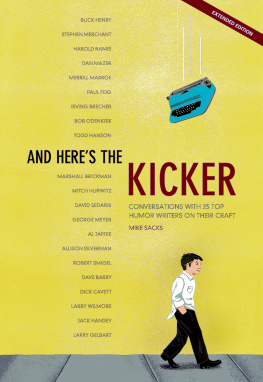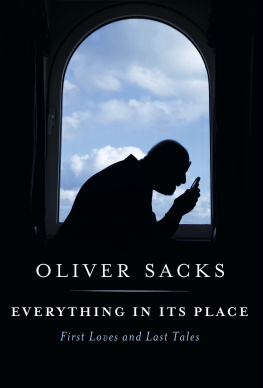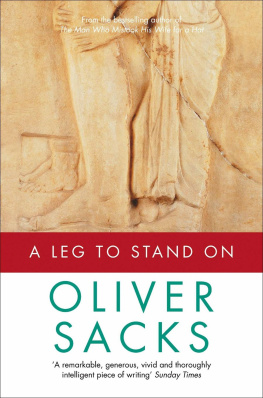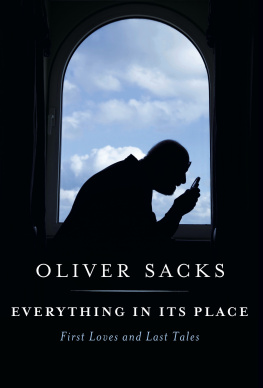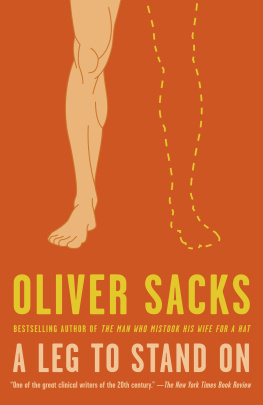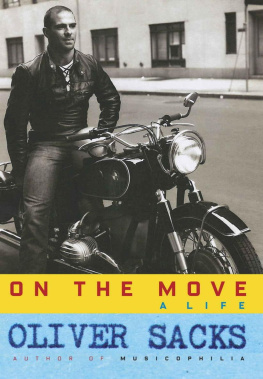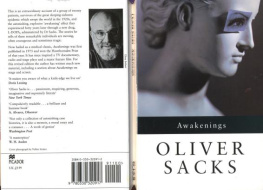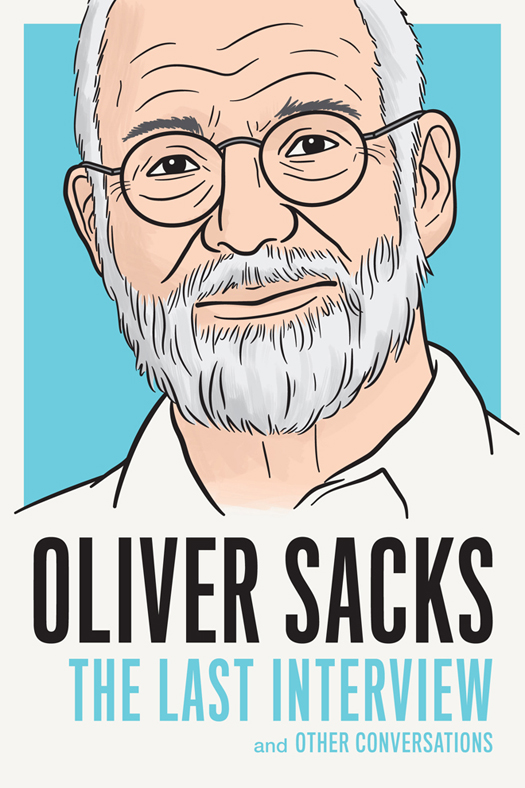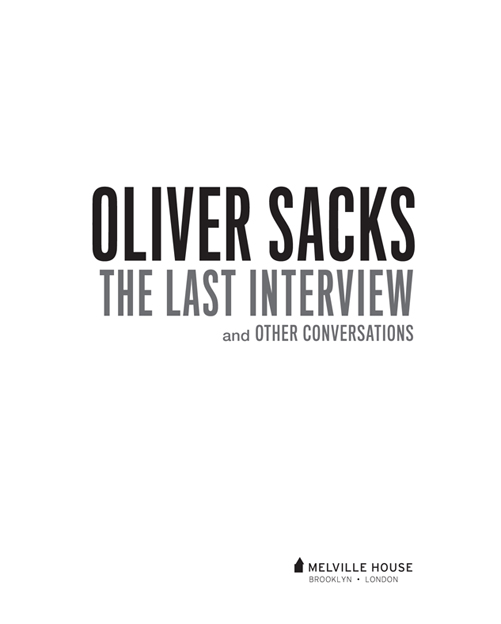OLIVER SACKS: THE LAST INTERVIEW
AND OTHER CONVERSATIONS
Copyright 2016 by Melville House Publishing
Neurologist Oliver Sacks was originally broadcast on Fresh Air on October 1, 1987. Reprinted with permission by WHYY/NPR.
An Anthropologist on Mars was originally broadcast on Charlie Rose in February 1995. Reprinted with permission by Charlie Rose/PBS.
Studs, Sacks, and Left-Handed Skills was originally broadcast on The Studs Terkel Program in 1995. Courtesy of the Studs Terkel Radio Archive.
Oliver Sacks on Empathy as a Path to Insight was published in the November 2010 issue of Harvard Business Review. Reprinted with permission.
The Joy of Aging was originally broadcast on On Point on July 18, 2013.
Dr. Sacks Looks Back was recorded live with Robert Krulwich at the Brooklyn Academy of Music on May 5, 2015. It was his last publicly released interview. Reprinted with permission by Radiolab/WNYC studios.
Some of these interviews were transcribed and have been lightly edited for clarity.
Melville House Publishing
46 John Street
Brooklyn, NY 11201
and
8 Blackstock Mews
Islington
London N4 2BT
mhpbooks.comfacebook.com/mhpbooks@melvillehouse
Ebook ISBN: 978-1-61219-578-0
v3.1
CONTENTS
Interview with Terry Gross
Fresh Air
October 1, 1987
Interview with Charlie Rose
Charlie Rose
February 1995
Interview with Studs Terkel
The Studs Terkel Program
1995
Interview with Lisa Burrell
Harvard Business Review
November 2010
Interview with Tom Ashbrook
On Point
July 18, 2013
Interview with Robert Krulwich
Recorded live at the Brooklyn Academy of Music
May 5, 2015
EDITORS NOTE
Dr. Oliver Sacks was morbidly shy, as one of the interlocutors in this collection noteswhich may be why there were relatively few formal interviews with the great neuroscientist, physician, and bestselling author.
Its rather surprising, considering Sackss long career and prolific output. Between 1970 and 2015, he wrote fourteen books, including Awakenings (which was adapted into a film starring Robin Williams), the blockbuster The Man Who Mistook His Wife for a Hat, and On the Move, a memoir published just six months before his death in August 2015. He was also a regular contributor to The New Yorker, The New York Review of Books, and the London Review of Books, among other publications.
For the most part, what seems to have convinced Sacks to grant interviews was the obligation to promote his work, and so the rarities collected herein were each conducted to coincide with the publication of a book and were broadcast on major programs such as Charlie Roses PBS television show, National Public Radios Fresh Air program, and the beloved icon Studs Terkels radio show. They are primarily accessible in audio format, and several were transcribed here for the first time by Melville House.
In these transcriptions, we endeavored to preserve Sackss verbal characteristicsfor example, his charming tendency to stutter and to often qualify his comments with the disclaimer sort of. Readers will also notice that some interviewers interrupt more than others (indicated with an em dash), and some are decidedly unhurried, relishing contemplative pauses (indicated with an ellipsis).
The first interview, the first of several Sacks had with Fresh Airs Terry Gross, offers an introduction to the doctors uniquely literary approach to his workdescribing states of mind as well as neurological conditions. Both of the interviews that followwith Charlie Rose and Studs Terkel, respectivelywere released after the publication of the book An Anthropologist on Mars, but they take distinct approaches to their subject. The Rose interview is more obviously personal, even philosophical: Sacks discusses his family, his friendship with Robin Williams, his appreciation of the brain as an unimaginably complex and beautiful part of who we are, and his longing for faith in a God he cannot, in the end, believe exists. The interview with Terkel, meanwhile, hews closely to the book itself, but in doing so reveals the inner workings of the author, whom Terkel introduces as a wonder of a neurologist, who has the soul of a poet but the writing gifts of a fine novelist.
The remaining interviewswith Lisa Burrell for the Harvard Business Review, Tom Ashbrook for NPRs On Point, and Robert Krulwich for NPRs Radiolabwere all conducted after Sacks was diagnosed with ocular cancer in 2005. They address mortality more directly, and explore the ways in which Sackss relationships to his patients had changed, now that he was a patient as well. Ashbrooks interview was conducted shortly after Sackss eightieth birthday, when hed been inspired to write an op-ed for The New York Times about his contentedness in old age (I can write up a storm, and I can swim up a storm I think swimming is one of the few activities one can do for the first century).
The final interview was presented to a live audience at the Brooklyn Academy of Music on May 5, 2015, after Radiolabs host Robert Krulwich had visited Sacks and recorded their conversation in his home. It is by far the most poignant in the collection. Sacks was keenly aware that this interview was to be among his last. Of his latest diagnosis, Sacks said, One or two people have written to me, you know, consoling me, and said, Well, you know, we all die. But fuck it! Its not like, We all die. Its like, You have four months. Its poignant, too, for the decades-long friendship between Krulwich and Sacks, which is evoked in the candor and wonderful intimacy of their dialogue.
The conversations collected herein, then, span nearly thirty years and cover a range of topics, but they are unified by the spirit of warmth, empathy, and ingenious curiosity for which Sacks was so famous and rightly beloved.
NEUROLOGIST OLIVER SACKS
INTERVIEW WITH TERRY GROSS
FRESH AIR
OCTOBER 1, 1987
GROSS : Dr. Oliver Sacks, welcome to Fresh Air.
SACKS : Nice to be here.
GROSS : Before we talk about the medical and spiritual implications of the work that you do, Im going to ask you to tell the story of The Man Who Mistook His Wife for a Hat, one of the case studies that youve written about. This was a music teacher and singer who didnt recognize that he had a disorder. What were the symptoms that he was showing?
SACKS : Um, well, the first problem was that he had difficulty recognizing his students at the music academy. As soon as they spoke, he recognized them at once, but he couldnt recognize them visually. And soon he couldnt recognize anyone or anything visually. He couldnt recognize his wife, he couldnt recognize himself, he couldnt recognize common objects. He saw them perfectly clearly, but what he saw carried no meaning for him. And no sense. And this prompted him to sort of ingenious but sometimes wild and sometimes absurd guesses as to what he might be seeing.


